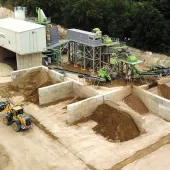Construction and demolition industries leading the way in recycling
Latest official survey shows Wales meeting some of its ambitious recycling targets
THE construction and demolition industries are leading the way in business recycling helping Wales to meet some of its ambitious recycling targets, according to the latest official survey.
The Construction and Demolition Waste Survey – produced by Natural Resources Wales on behalf of the Welsh Government – estimates that these sectors generated 3.4 million tonnes of waste in 2012. Of this, 87% was prepared for re-use, recycled, or recovered for use elsewhere.
Alun Davies, minister for Natural Resources and Food, said: ‘It is really encouraging to see the construction and demolition sectors treating waste as a resource and showing that our recycling targets are achievable. Our overarching waste strategy, Towards Zero Waste, sets out a target for the sector of 90% preparation for re-use recycling and recovery by 2019/20, so we are on track to achieve this.
‘However, preventing waste in the first place can save money. Preventing over ordering and preventing damage to construction products in transit are two obvious examples of how businesses can benefit.’
In the Construction and Demolition Waste Survey, the civil engineering sector generated the most waste (47%), followed by construction (41%), general building (7%) and demolition (4%). In terms of material types, the majority of construction and demolition waste generated consisted of soils (46%) and aggregates (37%), followed by mixed site waste (10%) and wood waste (3%).
The Welsh government’s Waste Prevention Programme, launched at the end of last year, sets out a target of a 1.4% reduction for construction and demolition waste treated off-site every year to 2050, based on a 2006/7 baseline.
Emyr Roberts, chief executive of Natural Resources Wales, said: ‘Businesses know that the key to economic sustainability is keeping costs down and better management of resources, and waste is no exception. The results from these surveys are encouraging in part but there is an opportunity to do more. This is why we are committed to working with businesses to support them to reduce and manage their waste appropriately to benefit the environment and the economy.’









